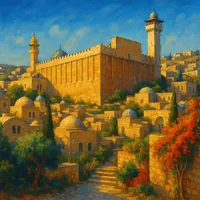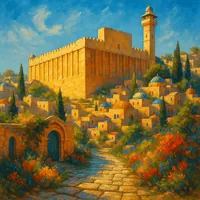Hebron, a city steeped in antiquity in the West Bank, is uniquely distinguished by its status as a pivotal religious and cultural epicenter. It is home to the Tomb of the Patriarchs, a site revered in Judaism, Islam, and Christianity, marking it as one of the few places where all three monotheistic religions converge in reverence. Hebron is also distinct for its bustling, limestone-laden Old City, intricately woven with the historical tension of a patchwork of Israeli and Palestinian settlements.
Notable points about Hebron
- Historical Significance: Hebron is one of the oldest continuously inhabited cities in the world, with evidence of settlements dating back to the Chalcolithic period. It is home to the Cave of the Patriarchs, a site of profound importance to Jews, Christians, and Muslims alike, believed to be the burial place of Abraham, Isaac, and Jacob.
- Religious Diversity: The city is unique for its religious significance and diversity, serving as a critical spiritual center for not only Muslims but also Jews and Christians. This mix of religions and cultures adds a rich and complex texture to Hebron's community life and history.
- Economic Hub: Hebron is a major economic center in the West Bank, particularly known for its pottery, glassblowing, and leather industries. The city's bustling markets and workshops offer a glimpse into the traditional craftsmanship that has been passed down through generations.
- Architectural Contrast: Architecturally, Hebron juxtaposes ancient structures with modern development. The Old City, with its narrow, winding alleys and historic stone buildings, contrasts with the more contemporary areas, appealing to those interested in both historical and modern urban aesthetics.
- Local Cuisine: Hebron offers a unique culinary experience with its blend of Middle Eastern flavors. Traditional dishes like musakhan (chicken with onions and sumac on bread) and ka'ek (sesame bread) reflect the region's agricultural abundance and are a must-try for food enthusiasts.
- Educational Opportunities: Home to several universities and educational institutions, such as Hebron University, the city offers ample opportunities for academic growth and cultural exchange, attracting students from various locations.
- Community and Family Life: Known for its strong sense of community and family-oriented lifestyle, Hebron is ideal for families seeking a close-knit environment. The city's traditional values emphasize family gatherings and communal activities, making it a welcoming place for raising children.
- Cultural Festivals: Hebron hosts a variety of cultural and religious festivals throughout the year, including the annual Hebron Heritage Festival. These events showcase local arts, crafts, music, and dance, providing visitors with a vibrant and immersive cultural experience.
- Conflict and Coexistence: Unlike other cities in the West Bank, Hebron is marked by a complex political situation, with a stark division between the Palestinian population and a small Jewish settler community. This situation highlights both the challenges and efforts toward coexistence in a conflicted region.
- Natural Surroundings: For outdoor enthusiasts, the region around Hebron offers beautiful landscapes, with rolling hills and fertile valleys ideal for hiking and exploration. The city's agricultural surroundings are key to its scenic beauty and local economy.


